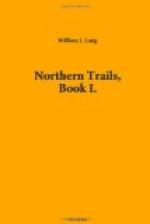Old Tomah, the trapper, was abroad now, taking advantage of the spring hunger. The wolves often crossed his snow-shoe trail, or followed it swiftly to see whither it led. For a wolf, like a farm dog, is never satisfied till he knows the ways of every living thing that crosses his range. Following the broad trail Wayeeses would find here a trapped animal, struggling desperately with the clog and the cruel gripping teeth, there the flayed carcass of a lynx or an otter, and yonder the leg of a dog or a piece of caribou meat hung by a cord over a runway, with the snow disturbed beneath it where the deadly trap was hidden. One glance, or a sniff at a distance, was enough for the wolf. Lynxes do not go about the range without their skins, and meat does not naturally hang on trees; so Wayeeses, knowing all the ways of the woods, would ignore these baits absolutely. Nevertheless he followed the snow-shoe trails until he knew where every unnatural thing lay hidden; and no matter how hungry he was, or how cunningly the old Indian hid his devices, or however deep the new snow covered all traces of man’s work, Wayeeses passed by on the other side and kept his dainty feet out of every snare and pitfall.
Once, when the two cubs that hunted together were hard pinched with hunger, they found Old Tomah in the twilight and followed him stealthily. The old Indian was swinging along, silent as a shadow of the woods, his gun on his shoulder and some skins on his back, heading swiftly for the little hut under the cliff, where he burrowed for the night as snug as a bear in his den. An old wolf would have known instantly the danger, for man alone bites at a distance; but the lop-eared cub, which was larger than his brother and therefore the leader, raised his head for the hunting cry. The first yap had hardly left his throat when the thunder roared, and something seared the wolf’s side like a hot iron. The cubs vanished like the smoke from the old gun. Then the Indian came swiftly back on the trail, peering about with hawk eyes to see the effect of his shot.
“By cosh! miss um dat time. Mus’ be powder no good.” Then, as he read the plain record in the snow, “One,—by cosh! two hwulf, lil fool hwulf, follow my footin’. Mus’ be more, come soon pretty quick now; else he don’ howl dat way. Guess mebbe ol’ Injun better stay in house nights.” And he trailed warily back to hide himself behind a rock and watch till dark in front of his little commoosie.
Old Tomah’s sleep was sound as usual that night; so he could not see the five shadows that stole out of the woods, nor hear the light footfalls that circled his camp, nor feel the breath, soft as an eddy of wind in a spruce top, that whiffed at the crack under his door and drifted away again. Next morning he saw the tracks and understood them; and as he trailed away through the still woods he was wondering, in his silent Indian way, why an old wolf should always bring Malsunsis, the cub, for a good look and a sniff at anything that he is to avoid ever after.




